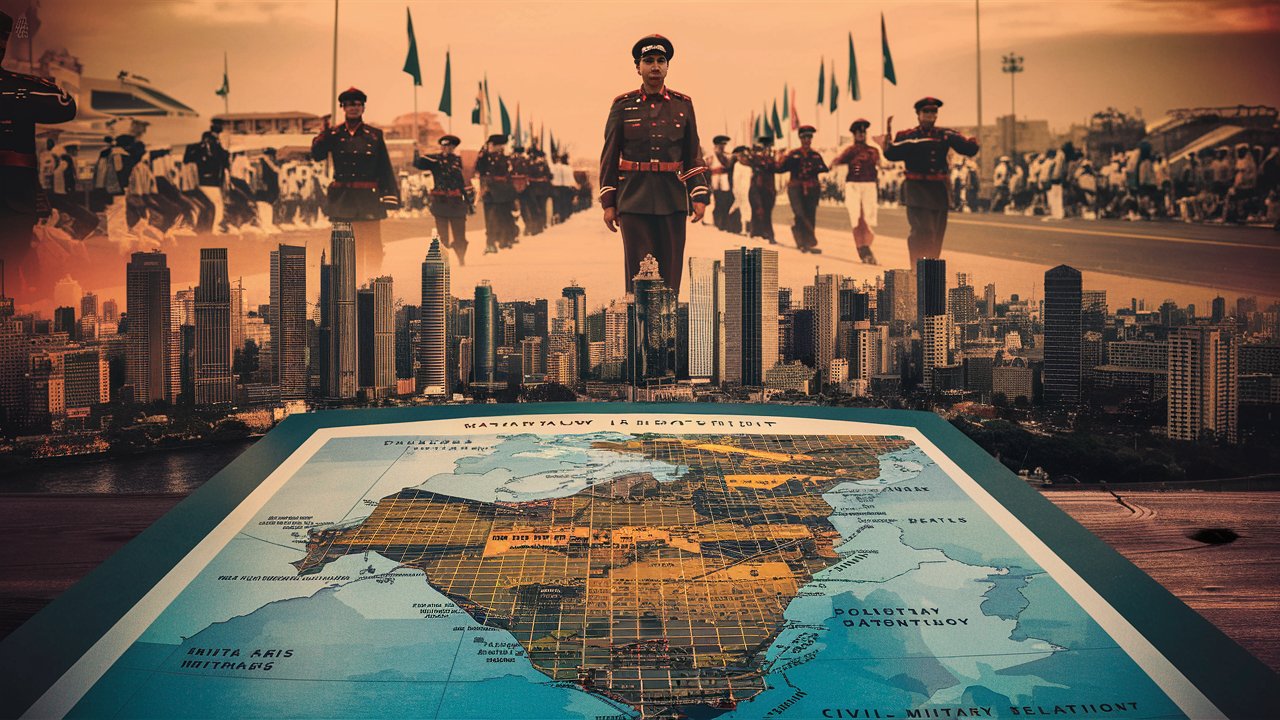Q. No. 7. In Modern day democracy there must be a Pragmatic Civil-Military relationship to deal with all the internal and external security threats.2024
Analyze with reference to the role of Pakistan's security and stability in South-Asia.

Q. No. 7. In Modern day democracy there must be a Pragmatic Civil-Military relationship to deal with all the internal and external security threats.
Introduction:
In contemporary democracies, maintaining a pragmatic civil-military relationship is essential for effectively addressing both internal and external security threats. This essay delves into the significance of such a relationship, particularly in the context of Pakistan’s security and stability within the South Asian region. By analyzing the interplay between civilian governance and military involvement, we can understand the complexities and challenges involved in ensuring security and stability in the region.
Historical Context:
Pakistan’s history has been marked by periodic military interventions in politics, leading to disruptions in democratic governance and stability. The military has often been perceived as a dominant force in shaping the country’s political landscape, which has sometimes strained civil-military relations. However, in recent years, there have been efforts to foster a more pragmatic and balanced relationship between civilian institutions and the military, recognizing the need for cooperation to address evolving security challenges.
Role in Internal Security:
A pragmatic civil-military relationship is crucial for maintaining internal security within Pakistan. While civilian institutions are responsible for governance and law enforcement, the military often plays a supportive role in combating internal threats such as terrorism, insurgency, and organized crime. Cooperation and coordination between the two sectors are essential for effectively addressing these challenges while upholding democratic principles and human rights.
Challenges to Civilian Governance:
One challenge in ensuring a pragmatic civil-military relationship is the potential for military interference in civilian affairs. Past military coups and interventions have undermined democratic governance and weakened civilian institutions. However, Pakistan has made significant strides in recent years to strengthen democratic norms and institutions, including civilian oversight of the military, which is essential for maintaining stability and civilian supremacy.
External Security Dynamics:
Pakistan’s security and stability are also influenced by external factors, including regional geopolitics and security threats. The military plays a vital role in safeguarding Pakistan’s borders, particularly in the context of longstanding tensions with India and security concerns in Afghanistan. A pragmatic civil-military relationship is necessary to formulate and implement cohesive strategies to address external threats while promoting regional stability and cooperation.
Balancing Civilian Oversight and Military Expertise:
Achieving a pragmatic civil-military relationship requires striking a delicate balance between civilian oversight and military expertise. Civilian institutions must assert their authority and maintain control over defense and security policies while respecting the military’s professional competence and operational autonomy. Effective mechanisms for civilian oversight, such as parliamentary committees and national security councils, can ensure accountability and transparency in decision-making processes.
Cooperation in Crisis Management:
In times of crisis, such as natural disasters or security emergencies, a coordinated response between civilian and military authorities is crucial. The military’s logistical capabilities and organizational structure make it a valuable asset in crisis management and disaster relief efforts. By working together harmoniously, civilian and military agencies can mitigate the impact of crises and demonstrate the resilience of democratic governance.
Conclusion:
In conclusion, a pragmatic civil-military relationship is indispensable for ensuring security and stability in Pakistan and the wider South Asian region. By fostering cooperation, accountability, and mutual respect between civilian and military institutions, Pakistan can effectively address internal and external security threats while upholding democratic values and principles. Continued efforts to strengthen civilian governance, promote transparency, and enhance civilian oversight of the military will be essential for consolidating democratic stability and advancing regional security cooperation in the years ahead.
visit : https://scholarshipresort.com/